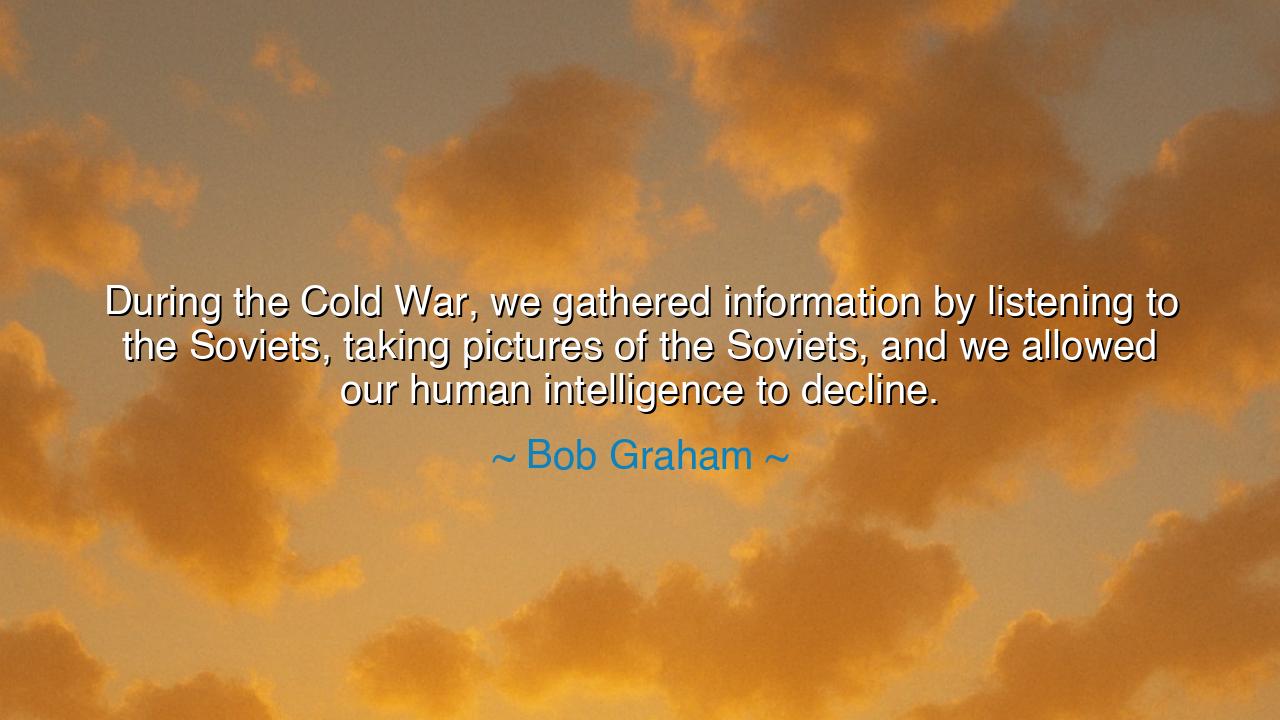
During the Cold War, we gathered information by listening to the
During the Cold War, we gathered information by listening to the Soviets, taking pictures of the Soviets, and we allowed our human intelligence to decline.






In the great dance of history, there are moments when the eyes of a nation, too focused on external threats, forget the very essence of what makes it strong: the ability to understand not just the world, but the self. Bob Graham's words, "During the Cold War, we gathered information by listening to the Soviets, taking pictures of the Soviets, and we allowed our human intelligence to decline," speak to a profound lesson about the nature of knowledge and the balance between technology and human connection. In this cautionary tale, we are reminded that the most powerful form of intelligence does not lie in the machines that capture distant images or intercept foreign messages, but in the deep, human connections that allow us to truly understand those who may appear as enemies.
This principle was not lost on the great warriors and sages of the past. In the time of Sun Tzu, it was said that to know the enemy, one must understand not just their movements and tactics, but the very nature of their character. Intelligence, in this sense, was not only gathered through spies and messages, but through insight—the ability to comprehend the motivations, fears, and desires that drive others. It is a lesson that transcends time: when a nation relies solely on mechanical intelligence—listening, watching, and observing from a distance—it loses the deeper understanding that comes from direct interaction, from being close enough to feel the pulse of another’s will.
The Cold War, which pitted the United States against the Soviet Union, was a time of great tension, where knowledge was power and secrecy was paramount. Yet in its fixation on surveillance—listening to intercepted radio transmissions, taking satellite pictures, and relying on technological advancements—the West forgot an essential truth. While satellites could capture the shapes of enemy missiles, they could not capture the emotions of the people beneath them. They could tell the story of Soviet equipment but could not reveal the intentions of its leaders. Graham’s words are a reflection on this mistake: that human intelligence, the art of understanding people at a personal, visceral level, was neglected in favor of the cold, impersonal data that only technology could provide.
The consequence of this shift is seen in the failure to anticipate some of the greatest movements and decisions of the Cold War. The collapse of the Soviet Union in 1991, though in hindsight almost inevitable, caught many by surprise. The intricate web of human relationships, the fear, the exhaustion, and the longing for change within the Soviet people and their leaders was not fully understood because the West had relied too heavily on distant observations rather than the understanding that comes from being present, from speaking directly with the people who are affected. Human intelligence was the missing link, and as Graham laments, it allowed a disconnect to grow between the intelligence-gathering agencies and the real, living people who could have provided the insight needed to predict the collapse.
History provides a powerful example of the importance of human connection. The tale of Abraham Lincoln during the American Civil War offers a stark contrast to the reliance on mechanical intelligence. Lincoln did not rely solely on reports or battlefield photos. He made it his practice to meet with soldiers, generals, and common people alike, understanding their hearts and minds. He often chose to trust his instincts and the direct communication he had with those around him over the cold facts and figures that were handed to him by his advisors. It was in these personal interactions, this understanding of the human spirit, that he crafted his decisions, ultimately leading to the preservation of the Union.
The lesson that we learn from both Graham’s reflection and the example of Lincoln is one of balance. In today’s world, where technology has become more powerful than ever, it is easy to fall into the trap of thinking that we can know everything through data. We gather endless streams of information, but we must remember that true understanding requires more than cold facts. It requires empathy, listening, and the ability to connect on a human level. In every area of life—whether in business, politics, or personal relationships—true intelligence comes not from what we can see from afar, but from the deeper understanding of those with whom we engage. The wise know that technology can assist, but it is the human touch that gives meaning to the information.
In your own life, strive to cultivate not just the skill of gathering information, but the wisdom to seek the deeper story. Ask yourself: Do I understand the people behind the data? Do I know their hearts, their struggles, their desires? Do not allow the tools at your disposal to blind you to the reality that only human connection can reveal. For in the end, true understanding is not just about what we can see, but what we can feel—what we can learn from the hearts and minds of those we encounter. This, more than anything, is the essence of intelligence.






AAdministratorAdministrator
Welcome, honored guests. Please leave a comment, we will respond soon